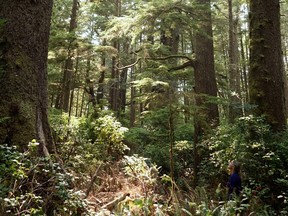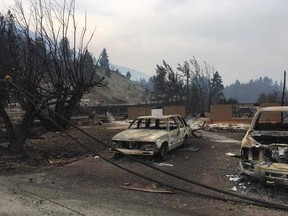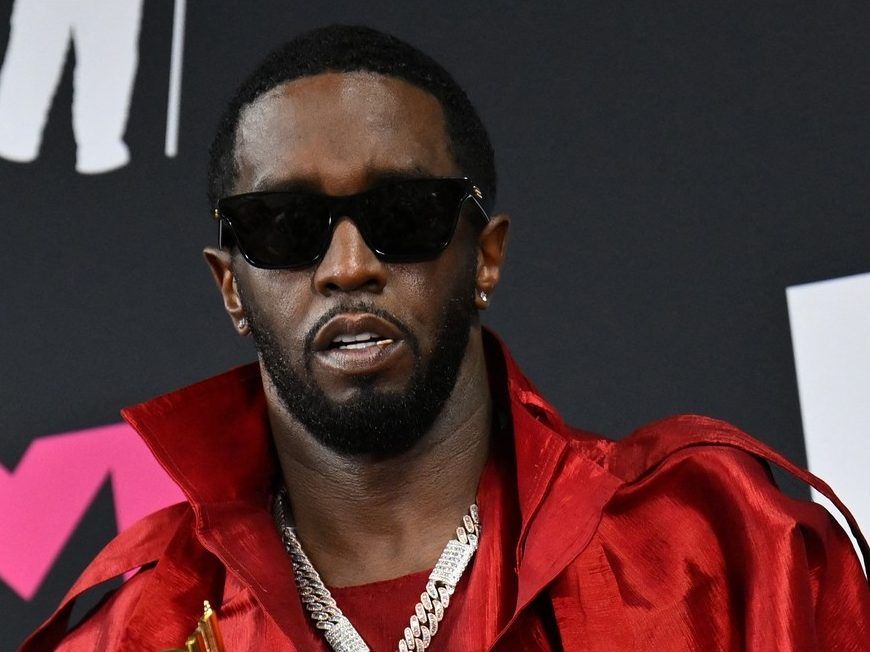Weekly roundup of local and international climate change news for the week of Sept. 9 to Sept. 15, 2024.
Published Sep 14, 2024 • 9 minute read

Here’s all the latest news concerning the climate crisis, biodiversity loss, and the steps leaders are taking to address these issues.
In climate news this week:
• RCMP enforcement of Fairy Creek logging protesters ‘unreasonable,’ says federal complaints agency
• Eby says B.C. will scrap the carbon tax if Ottawa drops legal requirement
• Environmental groups say carbon tax is ‘effective,’ urge B.C. to keep
• Harris rules out a ban on fracking during debate with Trump
Advertisement 2
THIS CONTENT IS RESERVED FOR SUBSCRIBERS ONLY
Subscribe now to read the latest news in your city and across Canada.
- Unlimited online access to articles from across Canada with one account.
- Get exclusive access to the Vancouver Sun ePaper, an electronic replica of the print edition that you can share, download and comment on.
- Enjoy insights and behind-the-scenes analysis from our award-winning journalists.
- Support local journalists and the next generation of journalists.
- Daily puzzles including the New York Times Crossword.
SUBSCRIBE TO UNLOCK MORE ARTICLES
Subscribe now to read the latest news in your city and across Canada.
- Unlimited online access to articles from across Canada with one account.
- Get exclusive access to the Vancouver Sun ePaper, an electronic replica of the print edition that you can share, download and comment on.
- Enjoy insights and behind-the-scenes analysis from our award-winning journalists.
- Support local journalists and the next generation of journalists.
- Daily puzzles including the New York Times Crossword.
REGISTER / SIGN IN TO UNLOCK MORE ARTICLES
Create an account or sign in to continue with your reading experience.
- Access articles from across Canada with one account.
- Share your thoughts and join the conversation in the comments.
- Enjoy additional articles per month.
- Get email updates from your favourite authors.
Sign In or Create an Account
or
Article content
Human activities like burning fossil fuels and farming livestock are the main drivers of climate change, according to the UN’s Intergovernmental Panel on Climate Change. This causes heat-trapping greenhouse gas levels in Earth’s atmosphere, increasing the planet’s surface temperature.
The panel, which is made up of scientists from around the world, has warned for decades that wildfires and severe weather, such as B.C.’s deadly heat dome and catastrophic flooding in 2021, would become more frequent and more intense because of the climate emergency. It has issued a “code red” for humanity and warns the window to limit warming to 1.5 C above pre-industrial times is closing.
Once again, Canada is experiencing a catastrophic wildfire season. Although wildfires usually ignite because of lightning or human activities, heat waves and drought from human-caused global heating dry out vegetation and make it easier for fires to start and spread, according to the Canadian Climate Institute.
For example, during the eight days of the 2021 heat dome in B.C., the number of wildfires rose from six to 175, with fires that spread during that time consuming nearly 79,000 hectares, including the entire town of Lytton.
Advertisement 3
Article content
But it’s not too late to avoid the worst-case scenarios. According to NASA climate scientists, if we stopped emitting greenhouse gases today, the rise in global temperatures would begin to flatten within a few years. Temperatures would then plateau but remain well-elevated for many centuries.
Check back every Saturday for more climate and environmental news or sign up for our Climate Connected newsletter HERE.
Climate change quick facts:
• The Earth is now about 1.2 C warmer than it was in the 1800s.
• 2023 was hottest on record globally, beating the last record in 2016.
• Human activities have raised atmospheric concentrations of CO2 by nearly 49 per cent above pre-industrial levels starting in 1850.
• The world is not on track to meet the Paris Agreement target to keep global temperature from exceeding 1.5 C above pre-industrial levels, the upper limit to avoid the worst fallout from climate change including sea level rise, and more intense drought, heat waves and wildfires.
• On the current path of carbon dioxide emissions, the temperature could increase by as much as 4.4 C by the end of the century.
• In April, 2022 greenhouse gas concentrations reached record new highs and show no sign of slowing.
• Emissions must drop 7.6 per cent per year from 2020 to 2030 to keep temperatures from exceeding 1.5 C and 2.7 per cent per year to stay below 2 C.
• 97 per cent of climate scientists agree that the climate is warming and that human beings are the cause.
By signing up you consent to receive the above newsletter from Postmedia Network Inc.
Article content
Advertisement 4
Article content
(Source: United Nations IPCC, World Meteorological Organization, UNEP, NASA, climatedata.ca)

Latest News
B.C. to scrap carbon tax if Ottawa drops legal requirement
Premier David Eby dropped a bombshell on Thursday, announcing he will get rid of B.C.’s consumer carbon tax if Ottawa also drops the federal tax that would take over if there wasn’t a provincial tax.
Opposition critics were quick to jump on the decision, with B.C. Conservative Leader John Rustad claiming victory after months of promising that one of the first things he would do if elected would be to scrap the carbon tax.
He said Eby’s announcement is typical of a “flip-flopping liar” that will do anything to get re-elected on Oct. 19.
The premier defended his decision, saying it is necessary in a changing political climate.
“A lot of British Columbians are struggling with affordability,” Eby said.
“The political consensus we had in B.C. has been badly damaged by the approach of the federal government, so if it decides to remove the legal backstop requiring us to have a consumer carbon tax in B.C., we will end the consumer carbon tax in B.C.”
Advertisement 5
Article content
—Alec Lazenby
Environmental groups urge Eby to keep the carbon tax
Environmental groups in B.C. have expressed concern after Premier David Eby announced he would drop the carbon tax if Ottawa drops the federal carbon tax.
Lawyers with the West Coast Environmental Law Association say B.C. is nowhere near meeting its 2025 greenhouse gas reduction target, and that carbon pricing is key in B.C.’s climate plan.
“After the wildfires, floods and heat waves B.C. has experienced recent years, we absolutely need a science-based plan to protect British Columbians from climate change and reduce our greenhouse gas pollution,” said Andrew Gage, a lawyer with West Coast Environmental Law.
“And B.C.’s plan has, for the past 17 years, relied on carbon pricing.”
The Sierra Club of B.C. urged the government to keep carbon pricing.
“Carbon pricing is an effective and low-cost tool for reducing carbon pollution and should be maintained,” said campaign director Shelley Luce.
“If the consumer aspect is eliminated, the province must make further pollution reductions by increasing and accelerating additional climate policies. Finalizing a cap on oil and gas emissions, denying new fracking and LNG project permits, and shifting government support to renewable energy are areas where we can make major reductions in carbon pollution.”
Advertisement 6
Article content
—Tiffany Crawford
RCMP enforcement of Fairy Creek logging protesters ‘unreasonable,’ says federal complaints agency
RCMP exclusions and checkpoints used during the Fairy Creek logging protests on Vancouver Island were unreasonable, the federal RCMP complaints commission said Wednesday.
In its review, the Civilian Review and Complaints Commission, an agency independent of the RCMP, found that the RCMP’s demand to search a demonstrator at a checkpoint on a public road was unfounded. The agency also said arresting the demonstrator after he refused to agree to the search was groundless.
The report says the man had been lawfully using the forest service road where he came upon police who were trying to keep people out of “exclusion zones” set up by the RCMP’s community-industry response group.
It says he was also not obligated to identify himself or submit to a police search after coming upon Mounties who refused to identify themselves by name, only reading out their badge numbers “quickly” and refused to repeat them.
The Fairy Creek protest began after logging permits were granted in 2020 allowing Teal Cedar Products to cut timber, including old-growth trees, in areas including the Fairy Creek watershed northeast of Port Renfrew.
Advertisement 7
Article content
—Tiffany Crawford

Mounties say there’s no evidence Lytton wildfire was arson, cause unknown
Mounties have concluded there’s no evidence that the devastating fire that swept through the community of Lytton more than three years ago was arson.
Police have now ended their investigation into the June 2021 wildfire, saying they could not pinpoint the cause of the blaze that killed two people and wiped out much of the village and part of the First Nation, a day after a Canadian temperature record of 49.6 C was set in Lytton.
A statement from the RCMP on Wednesday said there was “no evidence to suggest the fire was intentionally set by the actions, or inactions, of any individual(s)” and the criminal investigation “has not determined the cause of the fire.”
Police said they reviewed the weather conditions around the time, exhaustively searched two “areas of interest” where the fire may have started and interviewed 168 witnesses.
Climate scientists have said that global warming made the 2021 heat dome and wildfires in the Pacific Northwest significantly worse.
Advertisement 8
Article content
—The Canadian Press, with files from Tiffany Crawford

What to know about fracking, false claims and other climate issues mentioned during the debate
Amid a barrage of climate-infused weather disasters such as flooding and hurricanes, along with the shattering of heat records, wildfires and many Americans growing concerned about the planet’s warming, climate change was barely discussed during the presidential debate.
When asked the sole debate question on climate Tuesday night, Vice President Kamala Harris said, “young people of America care deeply about this issue,” and added that the United States has increased domestic production of oil to historic highs, a fact that will contribute to global warming.
Harris’ opponent, former President Donald Trump, didn’t answer the question, instead saying incorrectly that the administration of President Joe Biden and Harris is “building big auto plants in Mexico, in many cases owned by China.”
While climate was not front and centre, statements made by both candidates — on fracking, energy policy and renewables, provided windows into major climate policy issues.
Advertisement 9
Article content
On Tuesday, Trump falsely said about Harris: “If she won the election, fracking in Pennsylvania will end on Day 1,” arguing that her administration would harm the state and nation’s economy. Without a law approved by Congress, a president can only ban fracking on federal lands, which make up about two per cent of the state of Pennsylvania, where the debate took place.
Harris said during her 2020 campaign for president that she opposed fracking. But lately, including during the debate, Harris said she would not ban the practice if she is elected.
Though Harris said her values have not changed, the discussion of fracking was notable because the drilling method does not align with efforts to switch to clean energy, which Harris also says she champions.
—The Associated Press
Harris rules out fracking ban, threading needle on oil
Vice President Kamala Harris said she wouldn’t halt fracking if elected president, reversing her prior opposition to the technique used to produce most US oil and gas today.
“As vice president, I did not ban fracking,” Harris said Thursday in an interview on CNN, her most definitive statement on the issue since becoming the Democratic nominee. “As president, I will not ban fracking.”
Advertisement 10
Article content
The issue looms large for the Harris campaign, especially in Pennsylvania, which is both the second-largest US producer of natural gas and a key swing state. Harris’ shifting stance on the issue has provided a potent attack line for her Republican rival, Donald Trump, in the Keystone State, where he has cast her views as part of an extreme approach to energy policy that will cost jobs and raise gasoline prices.
The US can meet its climate goals without outlawing fracking, Harris said, pointing to the clean energy incentives in the sweeping Inflation Reduction Act as a way to drive progress on the issue. The 2022 law has triggered a wave of investment in manufacturing and deploying solar panels, batteries and other advanced technology.
—Financial Post
Canadian CEOs worry about climate change ’all or most of the time’: survey
The proportion of Canadian business leaders who say they are worried about climate change jumped dramatically in 2024.
In a newly released report by Deloitte, 85 per cent of the 129 Canadian executives surveyed between May and June of this year said they “worry all or most of the time” about climate change.
Advertisement 11
Article content
That’s a sharp increase from the 59 per cent who said they worried all or most of the time in 2023.
Notably, this year’s edition of the Deloitte survey shows many Canadian C-suite executives identify themselves as being personally affected by climate change. Fifty-four per cent of those surveyed said they have been impacted in the past year by flooding, while 47 per cent said they have experienced extreme heat and 33 per cent said they have been affected by wildfire or wildfire smoke.
“What showed up in the survey was the sense that executives had been personally impacted by a number of areas that are climate-related,” said Daniel Rowe, managing partner for sustainability at Deloitte.
“As executives are experiencing more directly those impacts in their lives, I think that translates perhaps to it being more front-of-mind for them.”
The findings coincide with what will likely go down as Earth’s hottest year on record, after a summer of scorching temperatures globally.
—The Financial Post
Bookmark our website and support our journalism: Don’t miss the news you need to know — add VancouverSun.com and TheProvince.com to your bookmarks and sign up for our newsletters here.
You can also support our journalism by becoming a digital subscriber: For just $14 a month, you can get unlimited access to The Vancouver Sun, The Province, National Post and 13 other Canadian news sites. Support us by subscribing today: The Vancouver Sun | The Province.
Article content
.png)
 4 days ago
16
4 days ago
16






























 Bengali (BD) ·
Bengali (BD) ·  English (US) ·
English (US) ·